|
|
|
Canadians who stockpile illegal weapons can have deadly intentions
|
|
As someone who was a White House correspondent when the Sandy Hook shootings happened in 2012, I am sickly familiar with gun violence and the vitriolic political arguments that erupt in the United States in the aftermath of horrifying mass killings – and result in zero action on gun control. Canada’s attitude about firearms was one of the most comforting aspects about moving back home in 2013. Thankfully, Canadians are mostly united on the need to ban assault weapons. The federal government’s reported determination to do so following the Nova Scotia
shootings has largely been met with relief, not bitter partisan debate.
But today in The Conversation Canada, R. Blake Brown of Saint Mary’s University explains there is still a vocal minority of Canadian gun enthusiasts, and some Conservative politicians, who believe the registration of guns will lead to confiscation. They often argue that people who own unlicensed firearms are guilty of mere “paper crimes.” But as the terrible events in Nova Scotia show, those who possess and stockpile illegal weapons can have deadly intentions.
Also today:
Regards,
|
Lee-Anne Goodman
Politics, Business + Economics Editor
|

|
|
Non-Coronavirus News
|
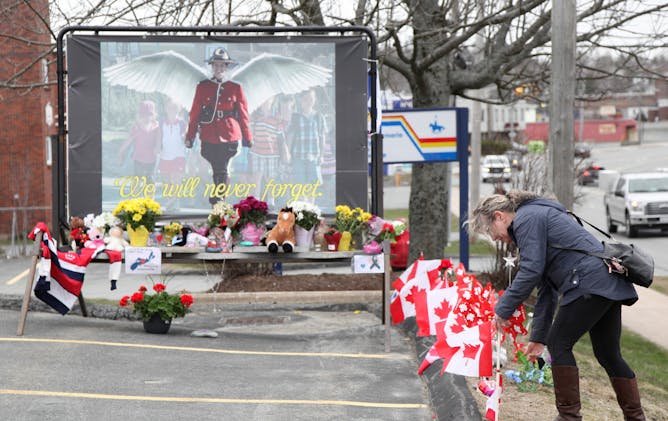
A woman places a pinwheel in front of a mural dedicated to slain RCMP Const. Heidi Stevenson, a victim of a shooting rampage carried out by a man with unlicensed weapons, in Cole Harbour, N.S., on April 24, 2020.
THE CANADIAN PRESS/Tim Krochak
R. Blake Brown, Saint Mary’s University
Far from just committing 'paper crimes,' the mass shooting in Nova Scotia shows the deadly threats posed by unlicensed gun owners.
|

Progesterone doesn’t seem to cause the blood clots, heart diseases and breast cancer associated with estrogen-dominant menopausal hormone therapy.
(Shutterstock)
Jerilynn C. Prior, University of British Columbia
Science shows that many perimenopausal miseries — such as hot flashes, night sweats and trouble sleeping — are caused by excess or variable estrogen, not by "estrogen deficiency."
|

Jean Vanier, founder of L'Arche communities, poses for a photograph after he received the Templeton Prize at St. Martins-in-the-Fields church in London, U.K., in May 2015.
(AP Photo/Alastair Grant)
Jane Barter, University of Winnipeg
Jean Vanier, Catholic founder of L'Arche International, allegedly had abusive sexual relationships. Religious tolerance for the veneration of male leaders may be partly to blame.
|
Coronavirus News
|
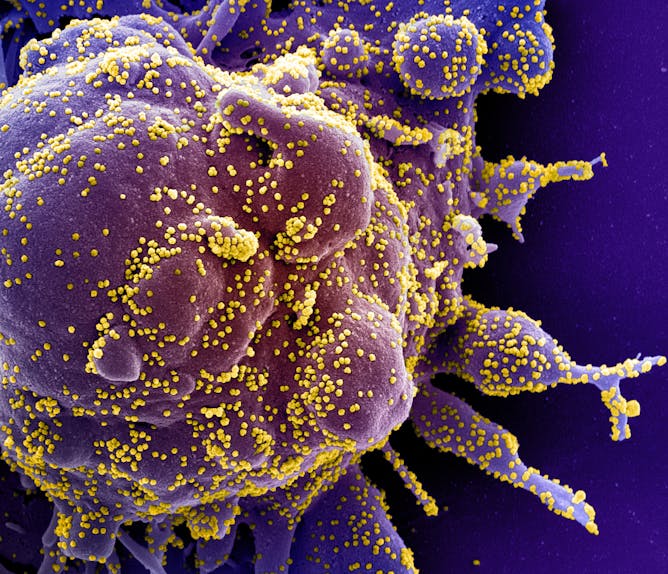
Colourized scanning electron micrograph of a cell heavily infected with SARS-CoV-2 virus particles.
(The National Institute of Allergy and Infectious Diseases/Flickr)
Thomas Merritt, Laurentian University
Fundamental research has informed what we know about coronaviruses up until the pandemic. With possible future outbreaks, continuing and developing this type of work is crucial.
|

Chief Public Health Officer Theresa Tam and Deputy Chief Public Health Officer Howard Njoo are reflected in a computer screen showing date on Canada’s COVID-19 situation during a news conference in Ottawa on April 13, 2020.
THE CANADIAN PRESS/Adrian Wyld
Kate Mulligan, University of Toronto; Jennifer Rayner; Onye Nnorom, University of Toronto
Gathing race-based data during the coronavirus pandemic is essential for Indigenous communities, racialized people, and those with disabilities and mental health challenges.
|
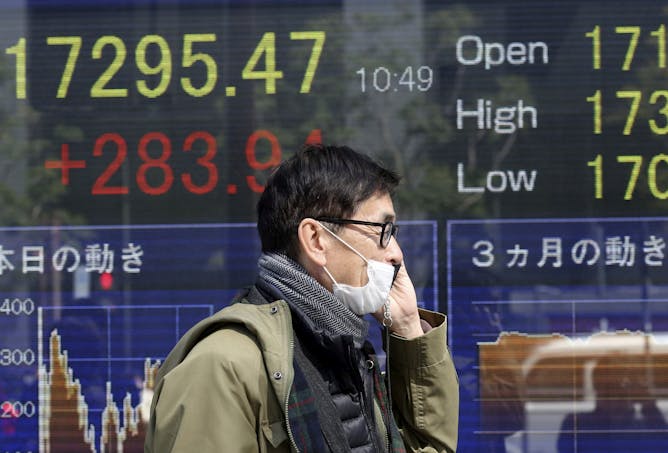
Economists are using models to try to determine what short- and long-term impacts the coronavirus pandemic will have on the global economy.
(AP Photo/Koji Sasahara)
Steven E. Salterio, Queen's University, Ontario
As countries get ready to re-open their economies, will there be a post-pandemic recovery? History and current economic models suggest those looking for a quick rebound will be disappointed.
|
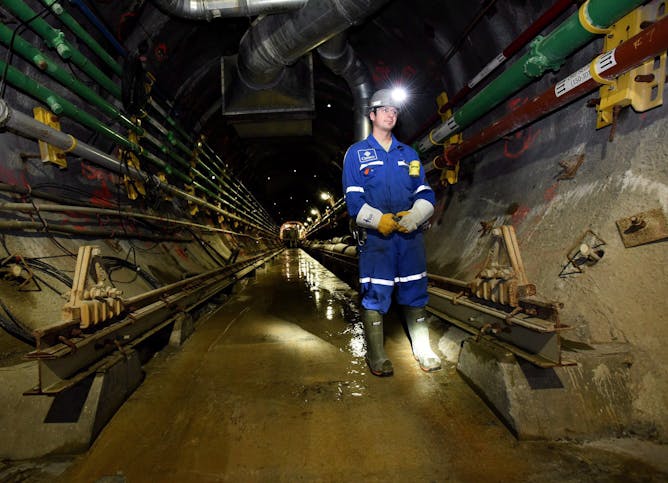
A worker walks through a tunnel in the Cameco uranium mine at Cigar Lake, Sask., in 2015.
THE CANADIAN PRESS/Liam Richards
John Steen, University of British Columbia
Other economic collapses have affected the mining industry, but the one spurred by the coronavirus pandemic is unusual.
|
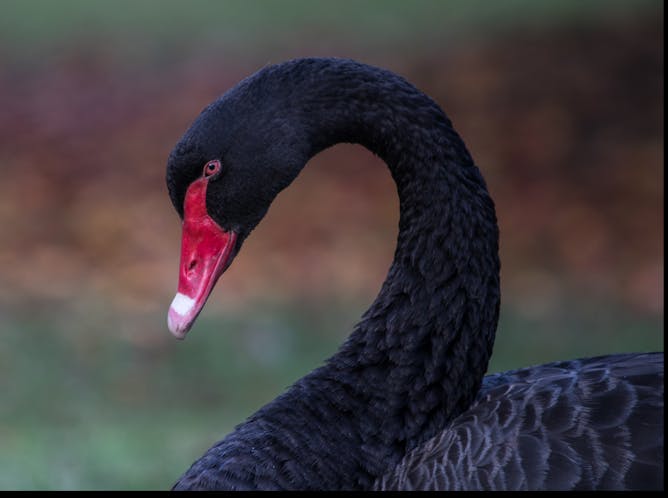
A black swan event must meet three criteria: it must be an outlier, must have a major impact and must be declared predictable in hindsight.
(Buiobuione/Wikimedia)
Glenn McGillivray, Western University
The danger of treating COVID-19 as an astronomically rare and improbable event is that we will treat it as such and fail to prepare for the next pandemic. And there will be another pandemic.
|
La Conversation Canada
|
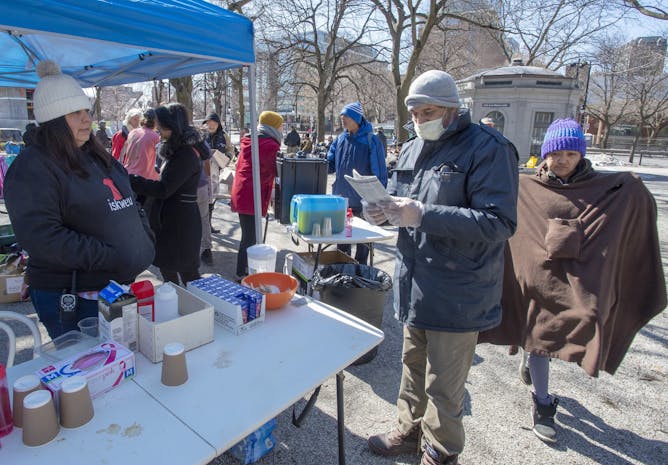
Des bénévoles de Résilience Montréal donnent de la nourriture et de l'aide aux sans-abri, le 27 mars à Montréal.
La Presse Canadienne/Ryan Remiorz
Samuel Lamoureux, Université du Québec à Montréal (UQAM); Consuelo Vasquez, Université du Québec à Montréal (UQAM)
S’il est certain que l’entraide est essentielle en temps de crise, et que des élans de solidarité ont émergé, une question persiste : pourquoi les réseaux d’entraide bénévoles n’ont-ils pas suffi?
|
|
|
Business + Economy
|
-
Shannon Reid, University of North Carolina – Charlotte; Matthew Valasik, Louisiana State University
Militant far-right groups are always looking to appear legitimate and to recruit more Americans to their causes.
|
|
Arts
|
-
Andrew McMillan, Manchester Metropolitan University
You don't have to understand or even like every poem you read.
|
|
| |
| |
| |
| |
| |
| |
|
|
|
|
|
|
|